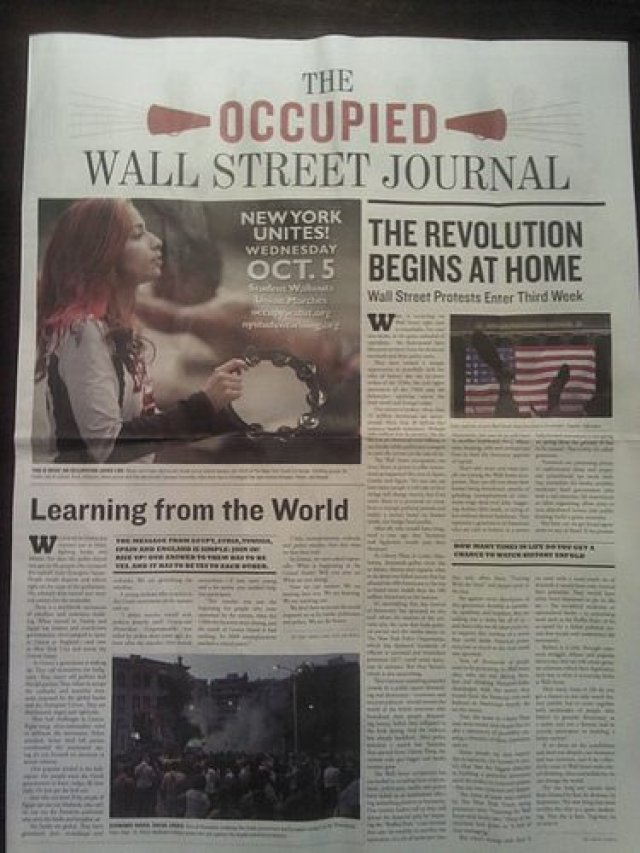
Inspired by the three-week-long Occupy Wall Street protest in New York, which has now spread to more than 100 cities across the US, ad-hoc activist coalitions in several Australian cities have called for similar occupations beginning on October 15.
Wall Street-style occupations have been called for Sydney, Melbourne, Perth, Brisbane and Adelaide. By October 6, close to 1300 people had indicated on Facebook that they would attend the Melbourne event.
Occupy Melbourne’s Nick Carson told Green Left Weekly that the Melbourne action, which will take place in City Square, aims to be “a broad-based, very inclusive grassroots movement of normal, everyday people”.
The first organising meeting for Occupy Melbourne took place on October 2. Carson said the meeting “agreed that we’re in solidarity with Occupy Wall Street, that Occupy Melbourne will commence on October 15, and that we will be camping in City Square in Melbourne indefinitely”.
Carson said the protest’s goals are intentionally broad and open-ended. Once the occupation begins, democratic spaces will be set up to allow participants to determine the shared aims of the action for themselves.
“What we all agree on is that our democracies aren’t functioning properly,” said Carson.
“We all agree on our opposition to corporate influence over our democracies. And we all agree that giant lobby groups, wealthy businesses and wealthy individuals, and groups and associations like business councils, have an unequal influence over our politicians.
“Our grievances sound broad, they sound a bit complicated and a bit messy, but that’s ok because that’s what it is.
“When the occupation begins there will be general assemblies held, and that’s where we can put motions up and put things to a vote and we can start to agree on some things … the general assemblies will be informed by working groups and workshops, discussions and open forums and information sessions at the camp.
“We want to get as many people involved as possible. It will start working really, really well when we get lots of people involved.”
In Sydney, protesters will converge in Martin Place on October 15, outside the head office of the Reserve Bank of Australia.

Occupy Sydney’s Larissa Payne told Green Left Weekly that she hopes the action will provoke wide-ranging debate and discussion about how to bring real democracy to Australia.
“The primary goal is to try to create a conversation that the government and the mainstream media frankly aren’t having,” she said. “It’s to unify the 99% of us that feel the government is being swayed or influenced or controlled too much by corporate entities.”
As in Melbourne, Payne said the Sydney protest did not reflect the views of any particular political party or group, but aimed to unite people from diverse backgrounds.
“A mix of people are involved [in Occupy Sydney]. It includes people from all different kinds of political ideologies and persuasions who are trying to unite under the umbrella of placing human need before corporate greed.
“We’re saying we’re unhappy with the way the government is running things right now, we see that the system is failing. We’re all affected in different ways. So to come under that one banner of putting human need before corporate greed is something that can unite all of us.”
Some mainstream and social media commentators have criticised the Occupy Australia protests, suggesting they are a misdirected imitation or echo of a US-specific protest movement. But Carson said many of the issues facing people in the US are very relevant to Australia.
He said: “This Occupy Together movement may have grown out of the United States, but it has now spread to almost every developed country in the world — Australia, New Zealand, Canada, Germany, France, the UK, Ireland — we’re looking at a lot of countries that are going to have occupations running in major cities.
“In terms of the grievances that we share and that are unifying all of us, they are relevant in almost every country in the Western world. These things are not just symptomatic of the United States.
“It’s also worth mentioning that these protests are also inspired, in part, by the people’s uprisings throughout north Africa and the middle east earlier this year and the revolutions that were born out of those movements.
“The model of people getting together, uniting together, on their common interests, instead of getting bogged down on what’s dividing them, is really what has made these movements very successful.”
Payne said she agreed that the Occupy Together movement is “not a nation-specific idea. It’s something that is relevant and important globally.”
Payne said the response to the call to Occupy Sydney was inspiring. “One thing that warms my heart is the support from an array of different groups that may otherwise have different agendas that divide them.
“We need to be active, we need to join together, and what has happened in America has been the perfect catalyst for us.”
Comments
Anonymous replied on Permalink
Anonymous replied on Permalink
Anonymous replied on Permalink
Anonymous replied on Permalink
Anonymous replied on Permalink
Anonymous replied on Permalink
Anonymous replied on Permalink
Anonymous replied on Permalink
Anonymous replied on Permalink
Anonymous replied on Permalink
Anonymous replied on Permalink
Anonymous replied on Permalink
Anonymous replied on Permalink
Anonymous replied on Permalink
Anonymous replied on Permalink
Anonymous replied on Permalink
Anonymous replied on Permalink
Anonymous replied on Permalink
Anonymous replied on Permalink
Anonymous replied on Permalink
Anonymous replied on Permalink
Anonymous replied on Permalink
Anonymous replied on Permalink
Anonymous replied on Permalink
Anonymous replied on Permalink
Anonymous replied on Permalink
Anonymous replied on Permalink
Anonymous replied on Permalink
Anonymous replied on Permalink
Anonymous replied on Permalink
stuartmunckton@... replied on Permalink
Anonymous replied on Permalink
Anonymous replied on Permalink
Anonymous replied on Permalink
Anonymous replied on Permalink
Anonymous replied on Permalink
Anonymous replied on Permalink
Anonymous replied on Permalink
Anonymous replied on Permalink
Anonymous replied on Permalink
Anonymous replied on Permalink
Anonymous replied on Permalink
Anonymous replied on Permalink
Anonymous replied on Permalink